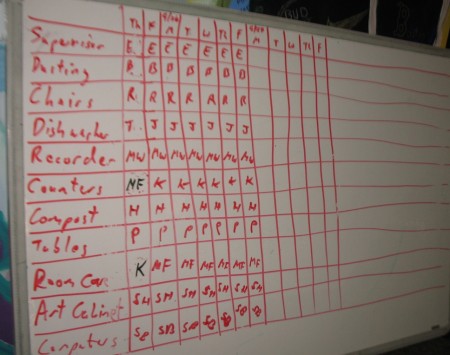
I pitched the jobs trading idea to the class today over lunch. Ever since our first immersion, when couldn’t figure out how to sit down together for dinner, I’ve been working on getting them to think of mealtimes as a time for community building. Yesterday and today we had group discussions while we ate, which actually worked quite well for having a civil conversation.
I set up the basic jobs table for the next two weeks and established that the jobs supervisor would be the only person with the ability to authorize trades. We’re using the whiteboard above, which I like because it’s a bit like the Iraqi stock exchange right after the invasion.
My biggest concern was about how students would try to game the system. Fortunately, before I could even finish my pitch one student offered another a dollar to do their job for them, so I could go into great, loving detail that the rule is that the only commodity that can be traded are the jobs.
So we’ll see what happens. The market had its first trade this afternoon, though it might have just been for the novelty of the thing. It did become apparent that we need to post the details of the classroom jobs somewhere since the students are not yet familiar with the intricacies of each job. I plan on keeping track of the market volume to see how things develop. It would probably be interesting to survey the students in about a month to see what they think about the market, and if it achieved its objectives of making the classroom cleanup more efficient and enjoyable.
